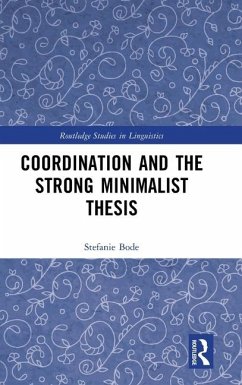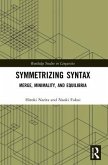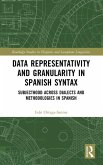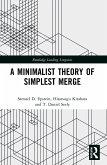This book unpacks coordination in the context of the Strong Minimalist Thesis (SMT), offering a new proposal for addressing this longstanding puzzle within research on Generative Grammar.
The volume's foundations are rooted in the SMT, which builds on the idea that laws of nature, such as simplicity, symmetry, and computational efficiency, shape the laws of language to their simplest form, as units of computation combined with a recursive structure-building device. The book explores the two main ways in which Generative Grammar research has been undertaken to deal with the issue of coordination within SMT as examined in such linguistic expressions as conjuncts, which combine in an unstructured way, but which run counter to a strictly minimalist approach. Bode proposes an alternative account of coordination based on simplest set-formation without resorting to additional mechanisms, rooting it more squarely within SMT theory and encouraging further discussion on new directions for SMT-related research.
This volume will be of interest to scholars in syntax and linguistic theory, particularly those interested in minimalist theory.
The volume's foundations are rooted in the SMT, which builds on the idea that laws of nature, such as simplicity, symmetry, and computational efficiency, shape the laws of language to their simplest form, as units of computation combined with a recursive structure-building device. The book explores the two main ways in which Generative Grammar research has been undertaken to deal with the issue of coordination within SMT as examined in such linguistic expressions as conjuncts, which combine in an unstructured way, but which run counter to a strictly minimalist approach. Bode proposes an alternative account of coordination based on simplest set-formation without resorting to additional mechanisms, rooting it more squarely within SMT theory and encouraging further discussion on new directions for SMT-related research.
This volume will be of interest to scholars in syntax and linguistic theory, particularly those interested in minimalist theory.








